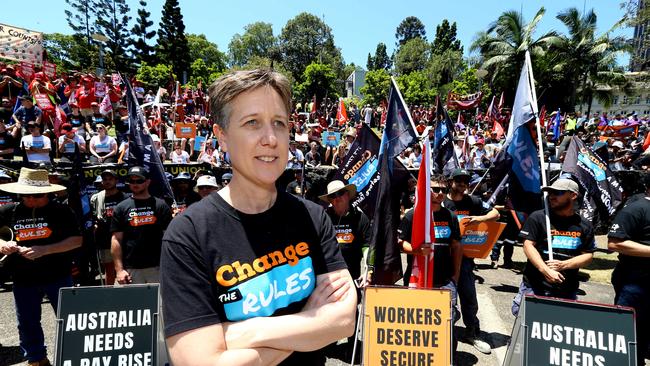
It is the incredible shrinking union movement and nothing they do can halt the inexorable decline in members.
The ACTU has fought to “rewrite” workplace laws; ran the “build a better future” campaign focused on workplace issues and also health, education and social services; argued it is okay to break “unfair” laws; challenged the rise of corporate power; tried to overturn reductions to penalty rates; and attacked the evils of “neoliberalism”.
The latest figures from the ABS reveal how well this has gone: union members as a proportion of the workforce has fallen from 15.3 per cent two years ago to 14.6 per cent today. Forty years ago, union members made up over 50 per cent of the workforce.
The ABS has not broken down the latest figure to identify the proportion of those in the public and private sectors. But there is likely to be just 8 per cent of workers in the private sector — a truly dismal number.
A large part of the decline is due to the changing nature of work. But unions have been complacent about the rise of the services sector and the decline in manual labour jobs, especially in manufacturing, mining and agriculture. It has not convinced workers to join their cause let alone remain part of it.
It is also not surprising membership is falling given many unions have been plagued with corruption while others like the Construction Forestry Maritime Mining and Energy union have become a serial law-breaking outfit.
The ACTU argues workers need stronger rights, a more equal bargaining relationship with employers, greater security of tenure and increased wages and entitlements. Joining a union is the answer, they say. But workers, evidently, don’t agree with this agenda or think unions can achieve it.
For ACTU secretary Sally McManus, increasing union members was supposed to be her “No. 1 priority”. Well, as performance indicators go, this one has not been met. The union movement continues to decline under her leadership.
This is a long-running existential crisis for unions, but they seem blind to it. They simply do not know how to stop losing members. Here’s a tip: stop doing what you are doing. It is time for a new strategy. It should be more about workplaces and less about politics.
The paradox is that the unions have never been less influential across the economy yet they are increasingly powerful inside the Labor Party. While union leaders moonlight as faction bosses and push their preferred policies into the party’s platform, their members keep deserting in droves.
Nothing, it seems, can stop the union movement from shrinking. Maybe they’ll keep going until there is nobody left. But who will be accountable for the decline and fall of Australia’s once great union movement? Don’t look to the ACTU because they are too busy to worry about members.




To join the conversation, please log in. Don't have an account? Register
Join the conversation, you are commenting as Logout